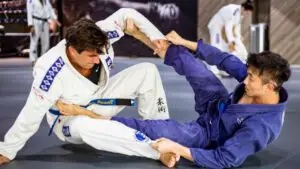Brazilian Jiu-Jitsu is well-known for being physically demanding and having a lot of technical detail. However, one of its most powerful impacts is that it makes people more mentally capable. BJJ is a useful way to build mental strength as it teaches you how to deal with stress on the mats and how to stay calm and focused when things get tough. In a world that is getting more complicated, stressful, and distracting, this martial art is more than just a way to protect yourself; it may help you deal with problems for the rest of your life.
The Science Behind BJJ and Mental Strength
More and more studies are backing up the idea that regular Brazilian Jiu-Jitsu training makes you mentally stronger. A study in the Journal of Combat Sports Psychology looked at more than 400 practitioners and showed that black belts scored much higher on measures of mental toughness, stress tolerance, and emotional stability compared to beginners.
This result is in line with what additional studies in sports psychology have found: that sports that involve solving complex challenges, dealing with controlled adversity, and making decisions in real time help people grow mentally over time. Brazilian Jiu-Jitsu has more of these traits than most other conventional sports because its regulations and situations are constantly changing.
Stress Management Through Physical Challenge
One of the most immediate psychological effects that practitioners describe is a reduction in daily anxiety and stress. The physical intensity and mental focus needed during training sessions naturally take your mind off of things that are bothering you. For many, stepping onto the mats is one of the few times in the day they are fully present.
The nature of BJJ training demands presence, there’s no room for distraction when facing a resisting opponent. Because of this, many people say that practitioners enter a “flow state,” which is a psychological term for being deeply focused and immersed in something. This state of flow helps lower anxiety, improve emotional control, and make thoughts clearer.
Many students at BJJ academies who work in high-stress fields like law, emergency medicine, or software engineering say that their time on the mats helps them clear their minds. One student, who worked as a full-time paramedic, said that training helped him clear his mind and get his emotions back in balance after a night shift full of traumatic situations.

Managing Adversity and Discomfort
You don’t just build mental strength by working hard; you also build it by putting yourself in uncomfortable situations and facing controlled challenges over and over again. Brazilian Jiu-Jitsu is one of the only sports that teaches people how to stay calm under pressure in an extremely practical manner.
You need both physical escape plans and emotional control when you’re stuck in a tight choke or pinned down by a bigger opponent. Many new students panic right away. Over time, students learn to breathe more slowly, stay calm, and work through tough situations step by step. This practice crosses over into daily life, helping people remain calm throughout family stress, work difficulties, or personal failures.
Brazilian Jiu-Jitsu and Trauma Recovery
BJJ can help those who are healing from trauma or post-traumatic stress disorder (PTSD) in addition to helping them deal with stress in general. Many veterans, first responders, and those who have been through emotional trauma use martial arts as a systematic and empowering way to deal with their feelings. What makes BJJ different is that it requires you to use your whole body, think strategically, and calm down your emotions while you’re under pressure.
A former combat medic with PTSD, for example, said that doing BJJ regularly became his main source of therapy. He started to feel like he had control over his thoughts and body again through controlled sparring and drills. He called the practice “peaceful chaos,” which means that stress is normal and easy to handle.
This fits with modern trauma therapy ideas, which involve facing manageable obstacles, being aware of your body, and making safe spaces for your nervous system to work properly. When taught appropriately, BJJ meets all three.
Mental Agility, Cognitive Flexibility, and Focus
The cognitive demands of Brazilian Jiu-Jitsu are significant. You have to quickly recognize patterns, make predictions, and make decisions in every roll. BJJ is different from static sports because you have to constantly change to deal with an unpredictable opponent. This procedure makes cognitive flexibility better, which is an important part of mental strength.
Many practitioners say that they are better at solving problems and are more patient. Brazilian Jiu-Jitsu also teaches people to be humble and to always seek out knowledge. Every day, practitioners are reminded that they can’t be perfect and that they can only learn by trying, failing, and not giving up. This way of thinking helps people deal with problems more efficiently in both training and life.
Conclusion
Brazilian Jiu-Jitsu is not just a martial art; it is also a way to improve your mental strength, emotional control, and cognitive flexibility. BJJ gives people a way to grow as individuals that goes beyond just being in shape or learning how to defend themselves. It offers this through structured adversity, strategic problem-solving, and community support.
BJJ is a powerful, easy-to-learn, and proven way to build the inner strength that modern life requires, especially as mental health is becoming more and more at risk.


